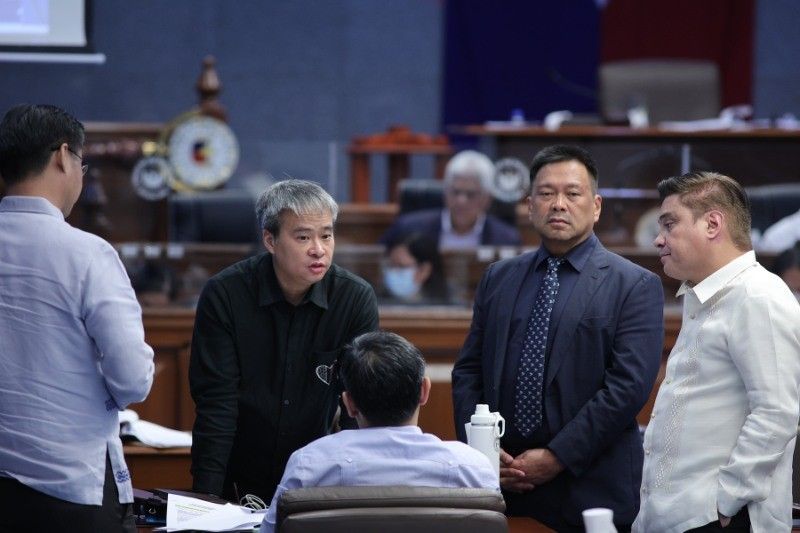Maharlika fund clears Senate hurdle
MANILA, Philippines — The bill seeking to create the Maharlika Investment Fund — touted by its advocates as a vehicle for economic progress and doubted by critics over potential abuses — passed the Senate on Wednesday with major changes, moving the contentious proposal closer to becoming a law. Senate Bill No. 2020 received 19 votes in […]


MANILA, Philippines — The bill seeking to create the Maharlika Investment Fund — touted by its advocates as a vehicle for economic progress and doubted by critics over potential abuses — passed the Senate on Wednesday with major changes, moving the contentious proposal closer to becoming a law.
Senate Bill No. 2020 received 19 votes in favor, one vote against and one abstention, giving the Maharlika fund’s more than four-month journey through the upper chamber’s legislative mill a sweet ending for its proponents.
Only Sen. Risa Hontiveros voted against the measure while her only colleague in the minority, Senate Minority Leader Aquilino Pimentel III, was not present. Sen. Nancy Binay abstained from voting.
The Senate immediately passed the measure on third reading after its approval on second reading as it was certified as urgent by President Ferdinand “Bongbong” Marcos Jr.
With the Senate’s approval of the Maharlika fund bill, the ball is back with the House of Representatives, with senators hoping that it will adopt their version of the measure to hasten the enactment of the proposal.
But Senate President Juan Miguel Zubiri said a bicameral conference committee composed of members from both chambers of Congress will meet Wednesday at 11 a.m. to thresh out differences between the House and Senate versions.
Bicameral conference committee meetings are typically closed to the public and lawmakers may revive provisions that have been stripped from earlier iterations of a bill or introduce new ones that were never tackled in plenary.
The Maharlika fund was identified as a priority measure by the Marcos Jr. administration which it requested Congress to pass before the president’s State of the Nation Address in July.
Pension funds at risk?
Lawmakers assured that pension funds and social security will not be used to bankroll the controversial sovereign wealth fund. That specific provision, which civil society and academia lambasted in November, was removed in the first iteration of Maharlika proposed in the House.
SB 2020 contained a provision that allowed government financial institutions to still pitch into the fund following the approval of its board of directors.
During the period of amendments, the Senate accepted senators’ proposal to explicitly prohibit the Government Service Insurance System, the Social Security System, the Philippine Health Insurance Corp., the Home Development Mutual Fund, the Overseas Welfare Workers Association and the Philippine Veterans Affairs Office from investing in Maharlika.
Sonny Africa, executive director at local nonprofit IBON Foundation, has called out lawmakers in passing the bill.
“Proponents can’t even be clear on what the mandate of the Fund really is and confusingly say that it ranges from promoting socioeconomic development to getting the best financial returns on its investments,” Africa said in a Viber message.
“The best safeguard on scarce public resources is to put them to best use where they currently are and according to whatever measures are currently in place on funds of the national government, GOCCs or GFIs like LBP and DBP. The Maharlika Fund proposal bypasses these existing measures and, being so extremely politicized, only goes through the motions of putting safeguards in place,” Africa added.
Even BSP Governor Felipe Medalla said that the Maharlika has now evolved into a “national development fund.”
‘No rush’
Senate Minority Leader Aquilino Pimentel III earlier raised the constitutionality of Marcos’ certification of the Maharlika bill as urgent, saying there is no calamity or emergency that necessitates its immediate passage.
After his nearly two-hour turno en contra speech on Tuesday, Pimentel attempted to send back the Maharlika fund bill to the committee level for further discussions.
But this motion failed as 16 senators backed Zubiri’s ruling that the issue on the committee referral of the measure has been tackled by the plenary before.
Senate Majority Leader Joel Villanueva, however, said Marcos’ certification of the bill as urgent is “in order” as the president has the power to define what a calamity or emergency is.
Villanueva has denied that the Senate rushed in passing the Maharlika fund, contrary to accusations from minority lawmakers.
Funding for Maharlika
The Senate’s version of the touted investment fund stated that the Maharlika Investment Corp.’s funding will come from government financial institutions. Broken down, the Land Bank of the Philippines and the Development Bank of the Philippines will pitch in P50 billion and P25 billion each.
The national government is contributing P50 billion, composed of the Bangko Sentral ng Pilipinas’ dividends. For the first two years of the fund’s existence, the central bank will need to remit all its declared dividends to the fund.
After that, those dividends will be split evenly, with 50% each bankrolling the Maharlika’s funding and the BSP’s capitalization.
The government’s share from state-owned Philippine Gaming Corp., pegged at 10% yearly lasting five years, also joined the funding mix.
The capital stock will comprise P500 billion, divided into 5 billion shares priced at P100 apiece. It will be built by 3.75 billion common shares, equivalent to P375 billion, and 1.25 billion preferred shares (P125 billion).
‘Improvement’
Africa noted that the latest version was an improvement from earlier proposals already.
“The form that we are passing now, I think satisfies our thirst for transparency and accountability on this measure,” Zubiri said as the period of amendments closed. “I think the number of amendments that we placed here will assure the Filipino people that this fund will be used properly, efficiently and effectively.”
Senators led by Sens. Grace Poe and Risa Hontiveros introduced stiffer penalties for violations of the law.
The Senate’s version also indicated that the Maharlika cannot invest in “areas” that violate laws and conventions that the Philippine government has signed.
The House’s version stated barred the Maharlika from taking on controlling stakes in its investments, but that provision was absent in the Senate’s iteration.
On the other hand, the composition of Maharlika’s board underwent several changes. In Senate Bill 1814, the board of directors numbered at 15 but the current version trimmed it to nine directors, with three coming from the private sector.
“The proponents not being able to find it in themselves to deliberate on the proposal rationally does not give confidence that the Fund will not be vulnerable to misuse, corruption and undue influence,” Africa said.











